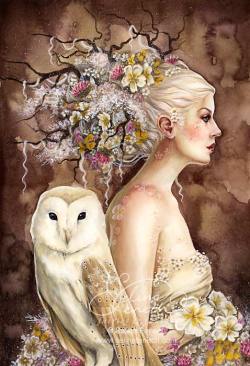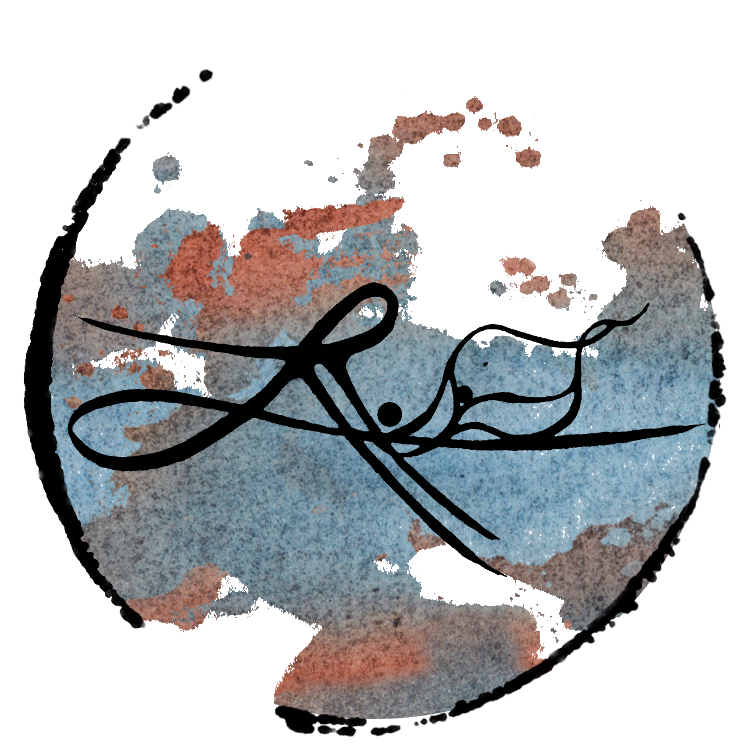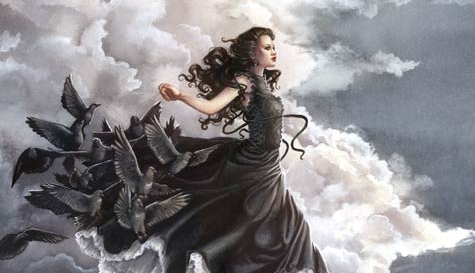| Part 1 | Part 2 | Part 3 | Part 4 | Part 5 |
Blodeuwedd’s Triumph: Justice and Transformation
Not being a mortal woman but conjured from bits and pieces of the natural world, we might say that Blodeuwedd retains in her being the fundamental amorality of wild nature, an innocence beyond man’s definitions of good and evil. But we might be equally right in saying that she embodies the ultimate triumph of a transhuman, earth-rooted ethics — an ethics grounded not in an anthropocentric social order but in the necessary ecological balance of the entire web of life, with its own natural laws and boundaries that cannot be violated or ignored by humans without consequence.
What were you expecting? A tame goddess who can be bribed with easy offerings? A pleasant springtime girl who asks for nothing but your adoration in return? An owl-feathered maiden of the forest to indulge your taste for the exotic and the dark? Were you hoping for a bedtime story with a moral at the end?
Blodeuwedd’s story isn’t over. It is on-going. It is forever unfolding in every moment, in every place where nature and culture conflict and comingle, in every breath that weaves us as human animals into the more-than-human world. It would be too easy to approach Blodeuwedd through mythology and ritual alone, to disconnect her from the messy, erotic, death-riddled real world of broom blossoms and barred owls.
Culture is not infinitely exportable. What we bring with us in our wanderings across the planet are attitudes and actions, objects and companions. But all of these not only shape the landscapes through which we move, they are irrevocably shaped by them: taking on new forms and expressions, new meanings and contexts, often in unpredictable ways.
 The gods, too, are changed by this shift from one place, one landscape, one ecology to another. We bring them with us in stories and symbols, holy objects and sacred rites. But those symbols take on new meanings as their relationship to the surrounding environment changes, and rituals that once connected us to the energies of the land and the blessings of our gods can become traps that keep us stuck in patterns of behavior and expectation that no longer serve us or the world in which we live. The meaning of objects and stories grow elusive and uncertain. What was in Wales a sunny meadow flower, in America becomes a noxious weed. What was once a story of licentiousness and betrayal of the rightful king becomes the story of a goddess turned against herself, kin against kin, two owls competing for survival in an increasingly inhospitable world. This is what it means for our gods to be alive.
The gods, too, are changed by this shift from one place, one landscape, one ecology to another. We bring them with us in stories and symbols, holy objects and sacred rites. But those symbols take on new meanings as their relationship to the surrounding environment changes, and rituals that once connected us to the energies of the land and the blessings of our gods can become traps that keep us stuck in patterns of behavior and expectation that no longer serve us or the world in which we live. The meaning of objects and stories grow elusive and uncertain. What was in Wales a sunny meadow flower, in America becomes a noxious weed. What was once a story of licentiousness and betrayal of the rightful king becomes the story of a goddess turned against herself, kin against kin, two owls competing for survival in an increasingly inhospitable world. This is what it means for our gods to be alive.
How do we respond to this shifting landscape of meaning? We might ask ourselves why we should seek out and worship the old gods at all, if their stories offer no certain solution to our contemporary problems. Why not abandon these cultural trappings completely and strike out in search of completely new relationships and new ways of living?
Do you hear it? Blodeuwedd’s whisper is on the wind… Reminding us that we cannot escape the roots and waters of which we are made. We can only transform them, transforming ourselves in the process. Our attempts to escape the trap of culture, like our desire to transcend the messy tangled relationships of the natural world, are likely to leave us simply feeling more alienated, disconnected and confused.
If there is a moral to be found in Blodeuwedd’s tale, it is this: justice is rooted in right relationship. Modern science has shown us that evolution is untidy and somewhat haphazard, and yet the long journey of trial and error, mutation and adaptation, can give rise to a world of delicate balance and astounding harmony. Right relationship is not conjured ex nihilo — it begins rooted in the dark recesses of a muddy, tangled earth.
We do not need to start from scratch. We only need to begin from where we are.
Photo Credits:
• “Catch Me,” detail © Selina Fenech [Purchase a print here]
• “Blodeuwedd,” © Selina Fenech [Purchase a print here]


This essay was just wonderful. Math is my favorite Welsh tale- I even started writing a play about it- and I think your comparison with the messiness and uncertainty of ecological restoration with the origins of Blodeuwedd and her making is inspired.
LikeLike
Thank you, Elizabeth! That means a lot to me. 🙂 I’ve been meditating on the Mabinogion and its stories for years now, and I continue to discover new layers of complexity and meaning! For me, that’s what it means to have a living mythology.
LikeLike
This is the best writing I’ve ever read from you! Clear, graceful, and illuminating. I first read the story of Blodeuwedd last year, and moved on without understanding it well. This essay made me realize that I should have examined what I didn’t understand, instead of passing it over.
LikeLike
Wow! Thanks, Meg! I felt the same when I first read the story of Lleu and Blodeuwedd, but something about it just would not let go. The story kept nagging at me, pulling me back to consider it more closely. Being able to work with Blodeuwedd in this way has given me a lot of hope about grappling with other stories in myth that have been elusive, confusing or uninspiring in the past! (Which are many! 😉
LikeLike
how can i find out more about this goddess? I have been drawing her for the last 17 years or so and am thankful for this much information on her.
LikeLike
I’d recommend starting with a simple Google search (links like this one and this one have some good information, along with suggestions for follow up resources). Aside from various translations, I also really enjoyed Evangeline Walton’s fictional re-telling of the four branches of the Mabinogion, which not only includes the story of Blodeuwedd and Lleu but also gives some insight into the greater historical/mythological context of the story.
Hope that helps! 🙂
LikeLike
This was a fantastic series. Very thought provoking read. Thanks 🙂
LikeLike
Thank YOU! 🙂
LikeLike
Hello,
Thank you for putting together this series of posts. I loved reading them and they have given me much to think about. I have been a long time devotee of Blodeuwedd and appreciate a fresh approach to her which you have offered me. In particular I was drawn to your idea of her as a Trickster, I had missed that aspect of this many aspected Goddess.
I have shared your blog with my sisters in the Sisterhood Of Avalon and they to enjoyed these posts very much.
I look forward to reading more of your work in the future and hope that one day our paths cross so I thank you in person.
Blessings,
Vyviane Armstrong
LikeLike